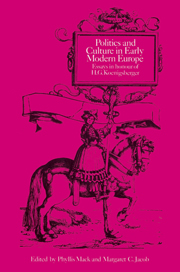Book contents
- Frontmatter
- Contents
- Introduction
- The court of the Spanish Habsburgs: a peculiar institution?
- The magnificent Lorenzo de' Medici: between myth and history
- Political rhetoric and poetic meaning in Renaissance culture: Clément Marot and the Field of Cloth of Gold
- The unlikely Machiavellian: William of Orange and the princely virtues
- The Estates of Brabant to the end of the fifteenth century: the make-up of the assembly
- Presents and pensions: a methodological search and the case study of Count Nils Bielke's prosecution for treason in connection with gratifications from France
- Between Bruni and Machiavelli: history, law and historicism in Poggio Bracciolini
- Constitutional discourse in France, 1527–1549
- Lieuwe van Aitzema: a soured but knowing eye
- John Calvin's contribution to representative government
- Luther and the humanists
- Scholars and ecclesiastical history in the Early Modern period: the influence of Ferdinando Ughelli
- ‘By an Orphean charm’: science and the two cultures in seventeenth-century England
- The crisis of the European mind: Hazard revisited
- Isaac Beeckman and music
- Decadence, shift, cultural changes and the universality of Leonardo da Vinci
- Bibliography of the writings of HELMUT GEORG KOENIGSBERGER
- Index
The unlikely Machiavellian: William of Orange and the princely virtues
Published online by Cambridge University Press: 20 October 2009
- Frontmatter
- Contents
- Introduction
- The court of the Spanish Habsburgs: a peculiar institution?
- The magnificent Lorenzo de' Medici: between myth and history
- Political rhetoric and poetic meaning in Renaissance culture: Clément Marot and the Field of Cloth of Gold
- The unlikely Machiavellian: William of Orange and the princely virtues
- The Estates of Brabant to the end of the fifteenth century: the make-up of the assembly
- Presents and pensions: a methodological search and the case study of Count Nils Bielke's prosecution for treason in connection with gratifications from France
- Between Bruni and Machiavelli: history, law and historicism in Poggio Bracciolini
- Constitutional discourse in France, 1527–1549
- Lieuwe van Aitzema: a soured but knowing eye
- John Calvin's contribution to representative government
- Luther and the humanists
- Scholars and ecclesiastical history in the Early Modern period: the influence of Ferdinando Ughelli
- ‘By an Orphean charm’: science and the two cultures in seventeenth-century England
- The crisis of the European mind: Hazard revisited
- Isaac Beeckman and music
- Decadence, shift, cultural changes and the universality of Leonardo da Vinci
- Bibliography of the writings of HELMUT GEORG KOENIGSBERGER
- Index
Summary
And yet these schollers of Machiavell, would here bleare our eyes, with these goodlie shewes of loyaltie, fidelitie, naturall clemencie, and such golden and glorious words, and yet notwithstanding they make no difficultie, to play with the othes which they take, & and with the wordes that they give…
Having already compared the King of Spain and his advisers to an impressive array of villains both biblical and classical, the author of Orange's Apology probably did not expect this denunciation to hold much shock value for his readers. Once invoked, the Italian is not mentioned again, and the reference to him is easy to miss. But its mere presence has tantalized later readers for the possibilities it suggests. How much did the prince of Orange know of Machiavelli's creation? What did it mean to him? How might it have influenced his own political assumptions and techniques? Alas, four centuries later we cannot even be sure that Orange knew any more about The Prince than the reference above. Although released in William's name and with his approval, the Apology was the work of other hands. For the rest, William the Silent is true to his sobriquet regarding his views, if he had any, on the ideas of the Florentine republican.
Still, the relationship between the prince and The Prince has long fascinated and bedeviled historians of the Netherlands revolt.
- Type
- Chapter
- Information
- Politics and Culture in Early Modern EuropeEssays in Honour of H. G. Koenigsberger, pp. 85 - 94Publisher: Cambridge University PressPrint publication year: 1987
- 1
- Cited by



